So you’ve decided to kick the plastic bag habit – great news!
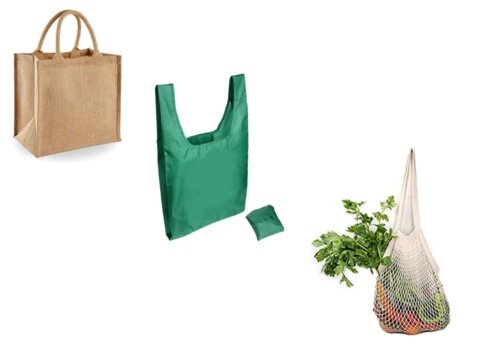
But won’t ditching plastic shopping bags make life difficult? Will it really have a positive environmental impact?
Luckily, there are lots of reusable grocery bags that don’t cost the Earth – and help make your grocery trips a breeze. Today, we’ll review some of the most common types of reusable bags so that you can find the best reusable grocery bags for you.
Table of Contents
- Key Considerations: Choosing the Best Reusable Grocery Bags
- Top Picks for Best Reusable Shopping Bags
- What Will You Choose?
Key Considerations: Choosing the Best Reusable Grocery Bags
When making the switch from plastic shopping bags to reusable shopping bags, the main factors to look out for are convenience and sustainability. The best reusable grocery bag for you should meet your standards in both categories.
How convenient are the alternatives to plastic shopping bags?
You need a bag that does the job. Think about what you need a bag for – how much will it need to hold? Can it carry a heavy load? Does it match your personal style?
Consider how practical it is for you to use.
Large, bulky bags are fine if you always carry them in the car, but if it has to fit into your purse – or even your pocket – look for something lightweight that folds up small.
If it doesn’t fit your lifestyle, you’re less likely to use it. And that sort of defeats the purpose!
How eco-friendly are the alternatives to plastic shopping bags?
The more times you use your bag, the more eco-friendly it becomes. Each time you refuse a ‘free’ plastic bag you’re helping cut environmental pollution and plastic waste, so choose something durable.
A bag made from recycled, repurposed and/or recyclable material is a great choice, but beware!
Paper bags are often seen as a sustainable alternative to plastic, but they are likely to be used only once and then thrown away. Paper bags actually use more energy than plastic bags to manufacture and, although they can be recycled or composted, around 80 percent of all paper bags end up in landfill.
So what are the best reusable grocery bags that are convenient and eco-friendly?
Top Picks for Best Reusable Shopping Bags
There are three main types of reusable grocery bags: bags made from synthetic fibers, bags made from natural fibers, and bags made from recycled materials. Let’s review the pros and cons of each.
Synthetic Fabric Reusable Bags
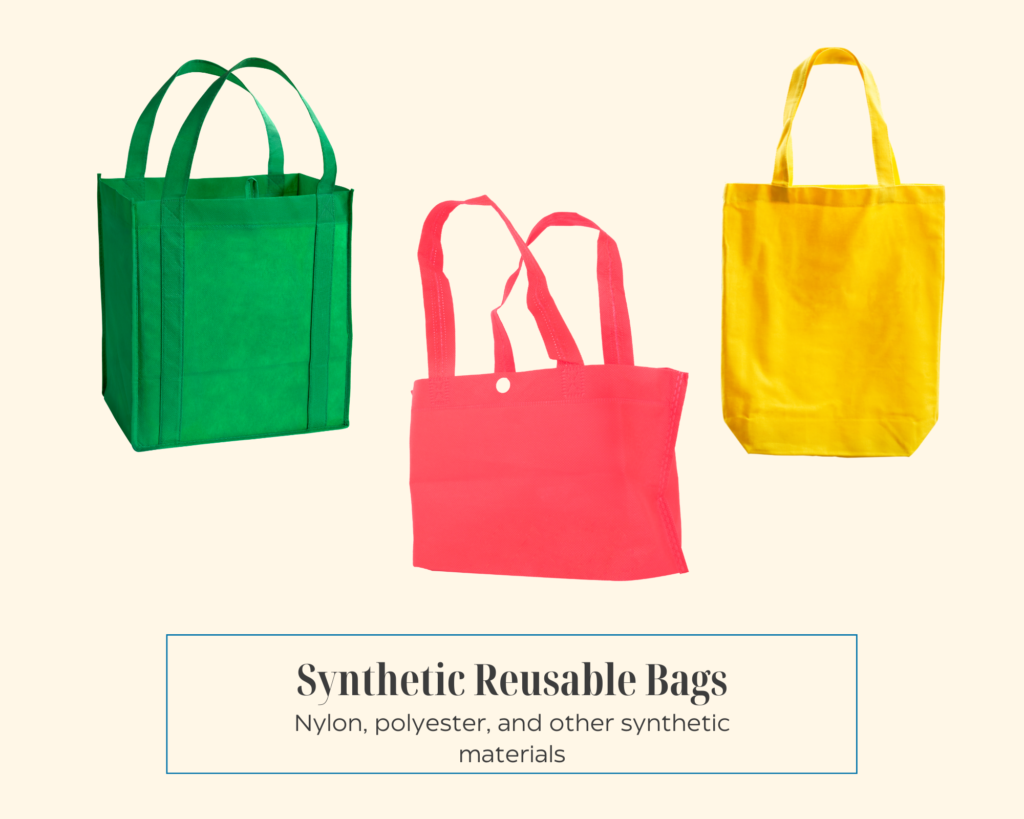
Synthetic fabrics include any non-natural fabric, such as polyester or nylon. While these materials are often made from fossil fuels, synthetic reusable bags are still more sustainable than disposable plastic if you use them enough times.
Number of uses until break-even: You need to use a polyester bag around 35 times before it offsets the environmental costs of its production (and becomes more eco-friendly than a disposable plastic bag).
The key benefits of any synthetic fabric are its increased durability and strength compared to natural fabrics. You can count on a synthetic fabric like nylon or polyester to stand the test of time, meaning you may need to replace the bag less frequently. Synthetic fabrics are also highly elastic, which can give your bag a little stretch to squeeze in extra snacks.
The main drawback of synthetic fabric is that it’s still plastic-based, so synthetic bags are energy intensive to create and difficult to dispose of sustainably.
For a list of the best reusable grocery bags made from nylon and polyester that are actually sustainable, check out our article: “6 Best Reusable Nylon and Polyester Shopping Bags.“
Folding Reusable Bags
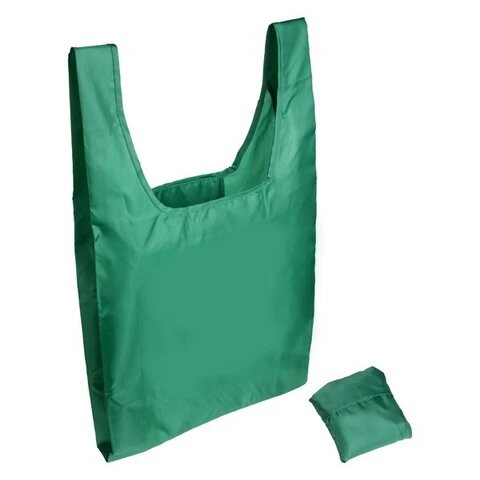
One of the most common types of reusable grocery bags made from synthetics are these convenient folding bags. Usually made from lightweight woven polyester or nylon, these bags fold up small enough to fit in a jeans pocket or on a keychain.
Key Benefit: A bag you can always carry with you will prevent you from ever having to use plastic. There’s nothing worse than getting to the store and realizing you’ve left your reusable bags back at home.
Potential Drawback: Due to the thin material that makes them so compact, they’re not always the strongest or most long-lasting bags, but they are super-convenient for impromptu shopping trips.
Consider how many plastic bags you think you can displace by owning a compact reusable bag. If it’s over 50 per year, you’re in the clear – it’s probably a good investment.
If it’s less than 50, you might be better off reusing disposable bags. Jam 1-2 in your purse, car door, or backpack. Use those instead of the new ones from the store.
Natural Fiber Reusable Bags
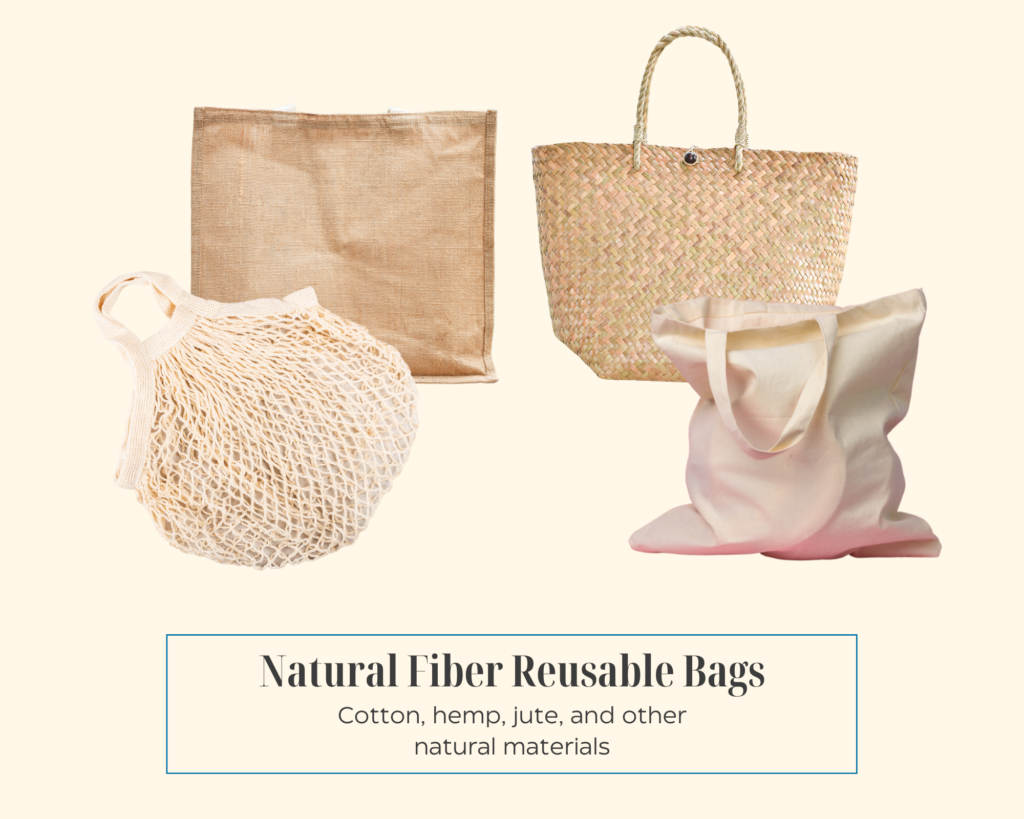
The next most common type of reusable grocery bag on the market are bags made from natural fibers like cotton, hemp, calico, or jute.
Shopping bags made from natural materials look great and are usually eco-friendly.
Pros:
- 100% plastic-free
- Washable
- Durable
- Versatile: You can use them as a book bag, beach tote or everyday purse.
Cons:
- Not always socially responsible
- Can require over 100 uses before becoming truly environmentally friendly
- Usually too bulky to fit in your pocket
Learn More: Bag Types and Break Even Points
The main criticism about natural fiber totes is that they are marketed as being environmentally friendly while many of them are not. Cotton bags, for example, are resource intensive to produce. Therefore they are not as eco friendly as some other alternatives like recycled materials.
Number of uses until break-even: You need to use a cotton bag 173 times before it’s more eco-friendly than a disposable plastic bag. Some estimates are even higher.
For a list of the best reusable grocery bags made from natural fibers that are actually sustainable, check out our article: “8 Best Sustainable Reusable Bags Made of Natural Fibers“
String Bags
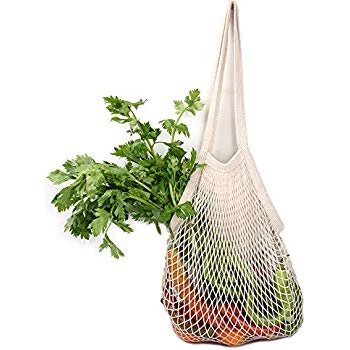
The string (or mesh) bag is a European classic – and one of the more popular bags made from cotton. Often seen in the markets of France, these knotted bags are very strong and durable. As well as grocery shopping, they make a rather practical beach tote – just don’t put your keys in there, as they’ll fall through the mesh!
A benefit of the string bag is that some use less material, can fold up smaller than fabric totes, and you get more style points.
Drawback: The same concerns apply to this bag as with other natural fiber totes.
If you’re serious about reducing your environmental impact, we recommend you choose one to two styles that work best for you and stick with it. If the conventional tote isn’t quite your style, the string tote is a good alternative.
Recycled Materials Reusable Bags
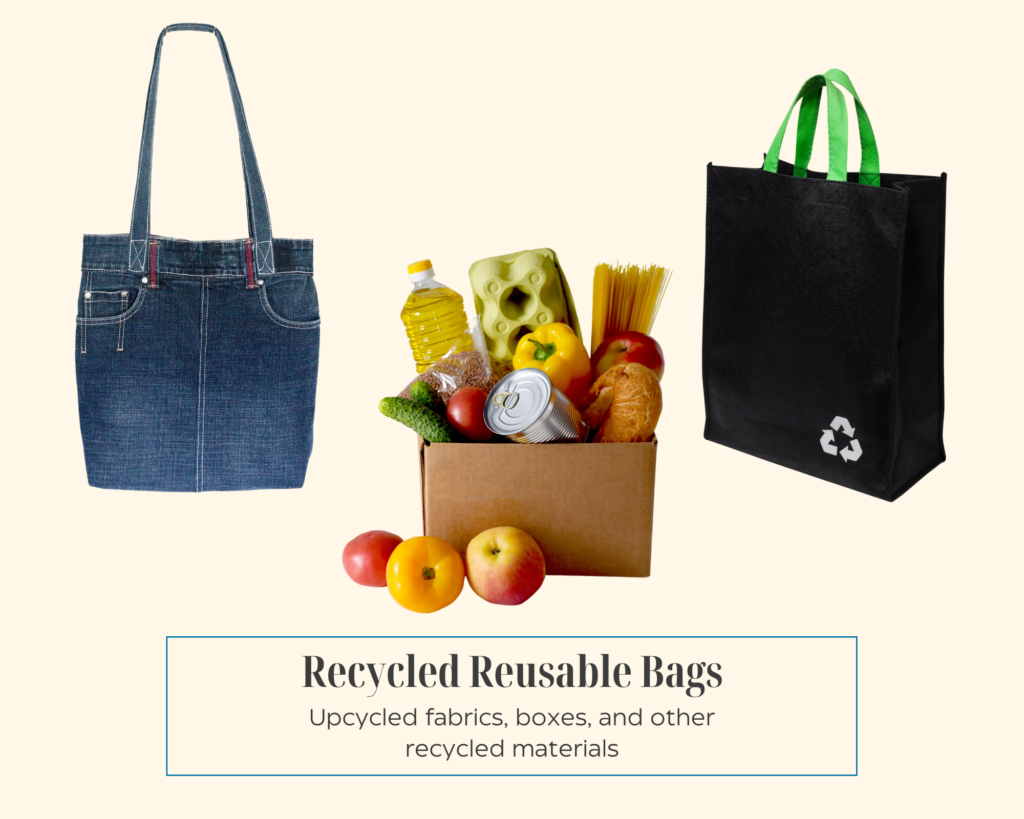
Finally, some of the best reusable bags are made from recycled materials. Let’s take a look at a few examples.
Recycled Fabric Reusable Bags
Products made from virgin materials, even if the materials are natural or eco-friendly, cost more to make from an environmental impact perspective. Since raw material production has a high environmental impact, you need to keep using these bags for a long period of time in order for them to become more environmentally friendly than disposable bags.
Totes made from recycled materials, on the other hand, can be more environmentally friendly than disposable bags even without high numbers of uses.
If you want to decrease your environmental impact as much as possible, do your due diligence before purchasing. Investing in a tote that is made from recycled or repurposed materials instead of virgin fabrics helps you become more eco-friendly even with your first use of the bag.
Cardboard Boxes
Chances are you’ve already experienced this at Costco.

It’s not glamorous, but using cardboard boxes to carry your shopping is much better than disposable plastic bags, as you get to give new life to something that would have been disposed of otherwise.
If you simply need to take your stuff from the shop to the car, and the car to the house, boxes will do the job just fine. Many stores and markets have them freely available, or you can save delivery boxes at home and take them with you. Reuse until they wear out then recycle them.
For bulk shoppers: Rather than buying a bulk reusable bag (usually made from vinyl) use cardboard boxes and recycle them when you’re done.
DIY Upcycled Bags
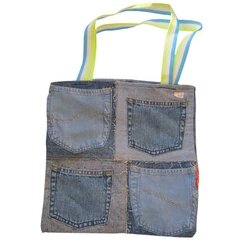
For the ultimate eco-friendly shopping bag, make your own using repurposed material. You can make a bag from an old t-shirt, a pair of denims, a pillowcase or any unwanted fabric such as a pair of curtains or bath towel; there are even some no-sew tutorials online you can find on YouTube.
Benefits: Unique, very eco friendly, and affordable.
Drawbacks: Requires a minimal level of sewing ability and time investment
You can also buy upcycled bags if you aren’t up for making your own. We recommend you ask a few questions to find out where the material came from, as not all ‘upcycled’ products for sale are genuine.
Other Reusable Bags
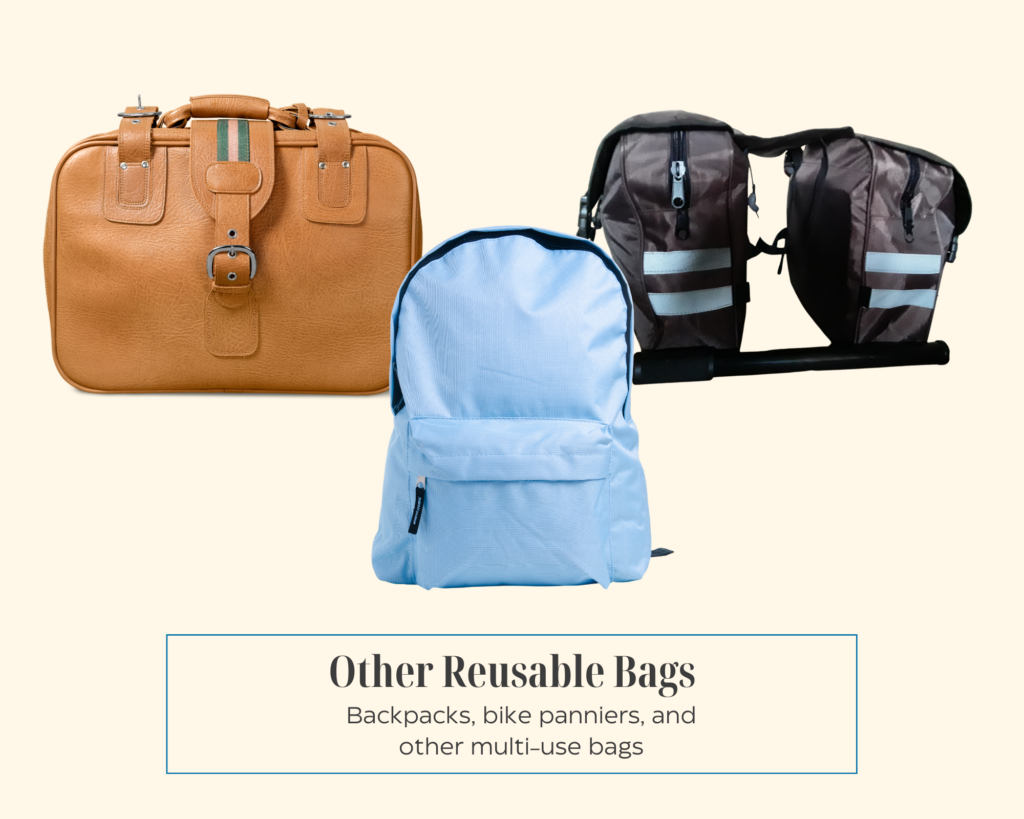
Finally, the most sustainable reusable bag for groceries is a bag you already own! Here are a few options.
Backpacks
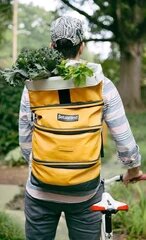
If you have a backpack, why not take it shopping?
It’s probably not worth buying one specially for this need, since the materials and manufacturing process are not so eco-friendly, but a backpack is great for bringing heavy items home from the store. It also frees up your hands to carry extra bags – or allows you to cycle home.
Bike Panniers
Detachable panniers are a great alternative to disposable plastic bags. They are versatile and tough to forget if you’re taking your bike to the store…
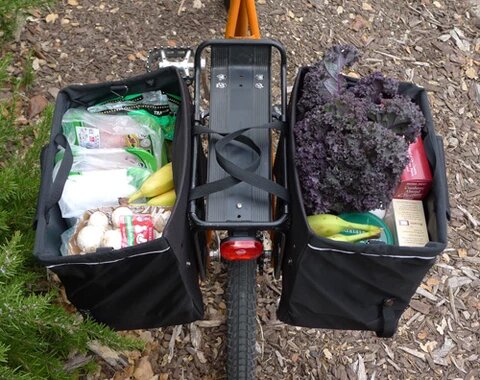
Benefit: Biking + reusable bags is a double whammy!
Drawback: Only good for dedicated trips to the store.
You may need to also invest in a compact bag to carry with you for time when you’re already out and need to swing by the store to pick something up.
If you’re biking to the store less than twice per month, you might be better off just loading your groceries in a backpack and biking home. The more you use these alternatives the more eco-friendly they are, so keep that in mind when considering what is best for you and your goals.
What Will You Choose?
Start now by checking out some of the best sustainable reusable bags for groceries here:
- 8 Best Reusable Grocery Bags Made from Natural Fibers
- 6 Best Reusable Nylon and Polyester Shopping Bags
Or, start building your plastic-free kitchen with sustainable Ziploc bag alternatives.
Whatever you pick, by choosing reusable bags over disposable plastic, you’re helping rid the world of plastic pollution – one shopping trip at a time.
